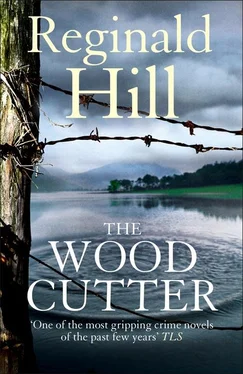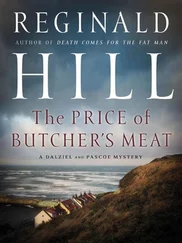Sir Leon was another one who missed the chance to sort me out. I remember when I was eight or nine I got caught by his game-keeper. I was never a serious poacher, though if the odd trout or rabbit came my way, I regarded it as the peasant’s tithe. The day I got caught peering into Sir Leon’s newly stocked tarn, it was the fact that I had no criminal intent that made me vulnerable. I was stretched out on the bank, raptly viewing the tiny fry at their play, when a heavy hand landed on my shoulder and I was hauled upright by Sir Leon’s head keeper.
When he realized who he’d got, he threw me into his pick-up and drove me through the forest to where my father was supervising a gang of loggers. Sir Leon was there too, and after the situation had been explained, he stared down at me and said, ‘This your brat then, Fred? What’s your name, boy?’
‘Wilf,’ I blurted.
‘Wilf?’
Then he squatted down beside me, ran his fingers through my hair, opened my mouth and peered in like he was checking out a horse, then winked at me and said, ‘Sure you don’t mean Wolf? Looks to me like you’ve been suckled by wolves. That might explain things! Suckled by wolves, and here’s me thinking they were all dead.’
He stood up, laughing at his own joke, and everyone else laughed, except me and Dad.
Thereafter every time Sir Leon saw me he called me Wolf and gradually the name stuck. I rather like the notion of being suckled by wolves, maybe because Sir Leon with his long nose and great mane of grey-brown hair looked like he might have a bit of wolf in him too. His name, Ulphingstone, certainly did.
Dad, however, hadn’t cared to be shown up in front of his workers and his boss. That night he stayed home and paid me more attention than I think he had since Mam died, and he didn’t much like what he saw. When I responded surlily to his remonstrations, he skelped me round the left ear, and when I responded angrily to that, he skelped me round the right.
After that I was obliged to mend my ways for a while, but as well as developing a taste for the wild life, I was already well grounded in the art of deception, and I continued on my independent way pretty much as before, only taking a little more care.
I suppose I was a bit of a loner, but that was through choice. At junior school I never had any problem getting on with the other boys; in fact most of them seemed keen to be friends with me, but I always felt myself apart from them. Maybe it was because I didn’t give a toss about who was going to win the Premier League, maybe it was something deeper than that. A lot of the girls were keen to be friendly too, but I reckoned they were a waste of space. At least with the boys you could run around and jump on top of each other and have a bit of a wrestle. It was a long time before I realized you could do that with girls too.
Then came secondary school. There was the usual bullying, but I’ve always had a short fuse. Neither size nor number made any difference – if you messed with me, I lived up to my name and reacted like a wild beast, wading in with fists, feet, teeth, and head till someone lay bleeding on the schoolyard floor. Eventually the physical bullying stopped, but there were still scores to settle. One day, aged about twelve, I found someone had broken into my locker and sprayed car paint all over the stuff I kept there. I had a good idea who it was. Next morning I smuggled in the cut-down lumber axe my dad was teaching me to use and I demolished my chief suspect’s locker and everything in it. All the kids thought I’d be expelled or at least excluded for that, but the Head just settled for giving me a long lecture and getting Dad to pay for the damage.
I didn’t get a lecture from Fred, but an ear-ringing slap which he made clear wasn’t for damaging the other boy’s gear but for ruining a perfectly good axe!
After that, helped by the fact that I got bigger and stronger every month, I was left strictly alone by the would-be bullies. I wasn’t thick, I did enough work to keep my head above water, and for some reason the teachers cut me a lot of slack. I never sucked up to any of them but most of them seemed to like me and I suspect I got away with stuff another kid might have been pulled up for. I never made any particular friends because the kind of thing I liked to do away from school, I liked to do alone. But I was always one of the first to get picked when my class was split up for schoolyard games.
The only significant contacts I made was age thirteen when I had my accident. You must have heard about my accident, Elf, the one that left me with the scars on my back that the bastards at my trial tried to claim established I was in those filthy videos. It was a real accident, not carelessness or anything on my part. A boulder that had been firmly anchored for a couple of thousand years decided to give way the same moment I put my weight on it. I fell off on to a sheet of ice and went bouncing and slithering down the fellside for a couple of hundred feet, and when the mountain rescue team reached me, they reckoned I was a goner. Didn’t I mention this in one of my other scribblings? I think I did, so you’ll know that fortunately there was no permanent damage and a few months later I was back on the fells with nothing worse than a heavily scarred back.
But what the experience did do was let me see close-up what a great bunch of guys the mountain rescue team was. They were really good to me. I was too young to join officially, but none of them objected when I started hanging out with them, and a couple of them really took me under their wing and taught me all about proper climbing.
Mind you, I did sometimes have a quiet laugh when they roped me up to do some relatively easy ascent that I’d been scampering up like a monkey all by myself for years, but I was learning sense and kept my gob shut.
Now at last we’re getting to Imogen.
I was fifteen when I first saw her, she was – is – a year younger.
I knew Sir Leon had a daughter and I daresay I’d glimpsed her before, but this was the first time I really noticed her.
Like I said, after that first encounter with Sir Leon, whenever our paths crossed he greeted me as Wolf and always asked very seriously how the rest of the pack was getting on. I’d grunt some response, the way boys do. Once when Dad told me to speak proper, Sir Leon said, ‘No need for that, Fred. The boy’s talking wolf and I understand him perfectly,’ then he grunted something back at me, and smiled so broadly I had to smile back as if I’d understood him. After that he always greeted me with a grunt and a grin.
There was of course no socialization between us peasants and the castle, not even in the old feudal sense: no Christmas parties for the estate staff, no village fêtes in the castle grounds, nothing like that. Sir Leon was a good and fair employer, but his wife, Lady Kira, my dear ma-in-law, called the shots at home.
Scion of a White Russian émigré family, Kira was more tsarist than her ancestors in her social attitudes. She believed servants were serfs, and anything that encouraged familiarity diminished efficiency. For her the term servant covered everyone in the locality. In her eyes we all belonged to the same sub-class, related by frequently incestuous intermarriage, and united in a determination to cheat, rob and, if the opportunity rose, rape our superiors.
I don’t think anyone actually doffed their cap and tugged their forelock as she passed, but she made you feel you ought to.
So when Sir Leon suggested to my dad I might like to come up to the castle one summer day to ‘play with the young ‘uns’ as he put it, we were both flabbergasted.
It turned out they had some house guests who between them had five daughters and one son, a boy of my own age, and Sir Leon felt he needed some male company to prevent his spirit being crushed by the ‘monstrous regiment’ (Sir Leon’s phrase again).
Читать дальше












